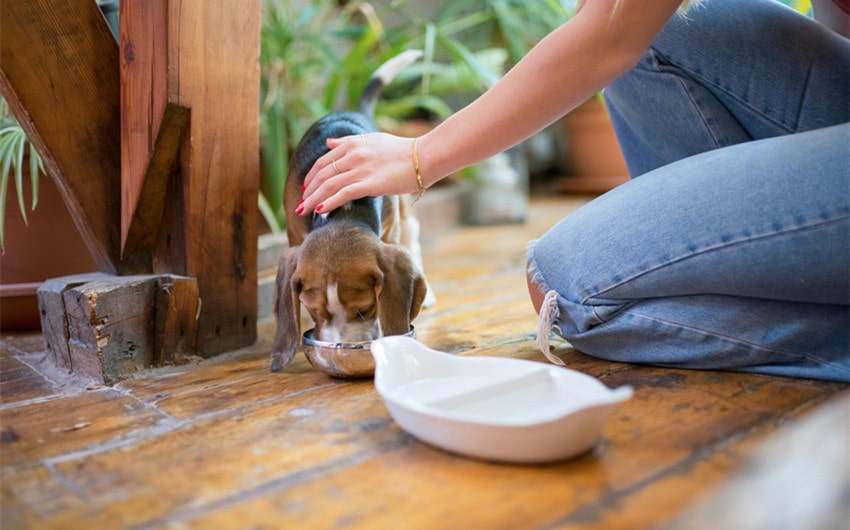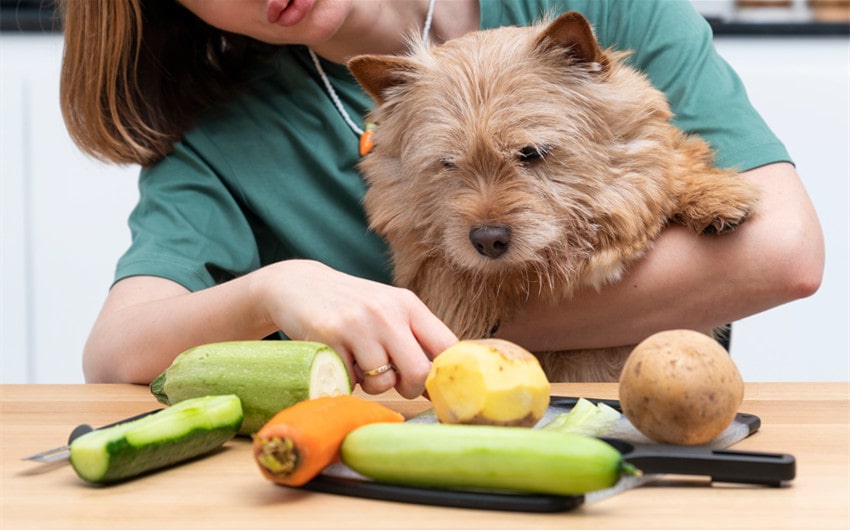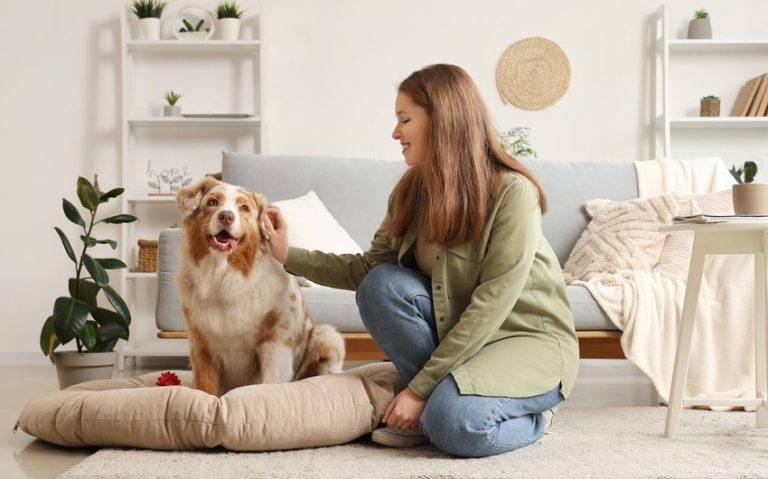As pet owners, we’re constantly questioning which human foods are safe for our furry friends. One common query is, “Can dogs have potatoes?” This versatile vegetable can be a nutritious addition to your dog’s diet when prepared properly. However, there are important considerations to keep in mind to ensure it’s both safe and beneficial. This article delves into the intricacies of feeding potatoes to dogs, providing you with the guidance needed to make informed decisions about your pet’s nutrition.
Feeding Dogs Potatoes

Can Dogs Have Potatoes?
Potatoes, when prepared correctly, can be a nutritious addition to a dog’s diet. They are rich in vitamins C and B6, potassium, and carbohydrates that provide energy. However, it’s crucial to serve potatoes cooked without any seasonings or additives.
Raw potatoes, including the green parts of potatoes, contain solanine, a glycoalkaloid poison that can cause vomiting, diarrhea, and even heart problems in dogs. Thus, cooking potatoes thoroughly is essential to eliminate solanine and make them safe for canine consumption.
Can Dogs Eat Potato Skins?
While potato skins are not inherently toxic to dogs, they do contain higher concentrations of solanine and oxalates, which can contribute to kidney stone formation in susceptible dogs. Given these risks, it’s generally recommended to peel potatoes before cooking them for your pet.
If you choose to feed your dog potato skins, ensure they are from fully ripened potatoes and cooked well to minimize solanine content. Monitor your dog for any adverse reactions, especially if they have a sensitive stomach or pre-existing health conditions.
Can Dogs Eat Mashed Potatoes?
Mashed potatoes can be a treat for dogs, provided they’re prepared without harmful ingredients. Common additives in mashed potatoes, such as butter, milk, salt, garlic, and onions, can be harmful to dogs. Garlic and onions, for example, can cause anemia in dogs, while dairy products can lead to digestive upset and diarrhea in lactose-intolerant dogs.
To make dog-safe mashed potatoes, simply cook the potatoes without adding any seasoning or dairy products. You can add a little bit of plain, unsalted chicken broth to make them more palatable and easier to digest.
Can Dogs Eat Baked Potatoes?
Baked potatoes are a safer option for dogs, as long as they’re served plain and cooked until soft. The baking process reduces the solanine levels, making them less toxic to dogs. However, toppings commonly found on baked potatoes, such as butter, sour cream, cheese, bacon bits, and chives, can be unhealthy or even dangerous for dogs.
When serving baked potatoes to your dog, make sure they are cool enough to eat and cut into small, manageable pieces to prevent choking hazards.
Can Dogs Eat Raw Potatoes?
Feeding raw potatoes to dogs is highly discouraged. Raw potatoes contain solanine, which is toxic to dogs in large quantities. Symptoms of solanine poisoning include gastrointestinal distress, lethargy, and, in severe cases, neurological disorders. Always ensure potatoes are thoroughly cooked and devoid of green spots or sprouts, which indicate higher solanine content, before offering them to your dog.
Additional Potato-Based Foods
It’s tempting to share more processed potato-based foods like french fries or potato chips with your dog, but these foods are not suitable for canine consumption. They are often high in fats, oils, and salts, which can lead to obesity and other health issues in dogs, such as pancreatitis. Moreover, the spices and flavorings used in these products can be irritating or harmful to dogs. Stick to plain, cooked potatoes in moderation as a safer alternative.
Benefits and Risks of Feeding Potatoes to Dogs

Benefits
1. Nutritional Value
Potatoes are a good source of vitamins, such as vitamin C and B6, which are essential for your dog’s immune system and nervous system health. They also provide important minerals like potassium, which supports heart health, muscle function, and digestive health. The fiber content in potatoes can promote healthy digestion and aid in maintaining bowel regularity.
2. Energy Source
The carbohydrates in potatoes are an excellent energy source for dogs, especially those that are highly active or require higher energy diets. Carbohydrates are essential for fueling your dog’s daily activities, from walks and playtime to training sessions.
3. Dietary Variation
Including potatoes in your dog’s diet can add variety to their meals, which can be especially beneficial for picky eaters. It offers a way to introduce new textures and flavors, making mealtime more enjoyable for your pet.
Risks
1. Solanine Toxicity
One of the primary risks associated with feeding dogs potatoes is solanine toxicity. Solanine is a compound found in green or unripe potatoes and potato plants. Ingesting solanine can lead to vomiting, diarrhea, and more severe symptoms like heart problems, difficulty breathing, and neurological issues. To minimize this risk, only feed your dog ripe, thoroughly cooked potatoes, and avoid green potatoes altogether.
2. Obesity and Diabetes
Potatoes are high in carbohydrates and calories, which, if not managed properly, can contribute to obesity and diabetes in dogs. These conditions are serious and can lead to further health issues, including joint problems, heart disease, and decreased lifespan. It’s important to feed potatoes in moderation, considering your dog’s overall diet and energy expenditure.
3. Digestive Issues
While the fiber in potatoes can benefit digestion, some dogs may experience digestive upset, including gas, bloating, or diarrhea, especially if they are not used to dietary fiber. Starting with small portions and gradually increasing the amount can help mitigate these issues.
4. Allergies and Sensitivities
Some dogs may be allergic or sensitive to potatoes. Symptoms of a food allergy or sensitivity can include itching, skin rashes, ear infections, and gastrointestinal problems. If you notice any of these symptoms after introducing potatoes to your dog’s diet, discontinue their use and consult with a veterinarian.
Safe Preparation and Serving Suggestions

1. Proper Cooking is Essential
Raw potatoes contain solanine, a toxic compound that can be harmful to dogs. Cooking potatoes thoroughly reduces their solanine content to a safer level. Boiling, steaming, or baking are the best methods to prepare potatoes for dogs, as these methods also avoid the addition of unhealthy fats and oils. Remember to allow the potatoes to cool down to room temperature before serving to prevent burns or discomfort.
2. Avoid Seasonings and Additives
Humans often add butter, salt, garlic, onions, and other seasonings to enhance the flavor of potatoes, but these additives can be dangerous for dogs. Garlic and onions are toxic to dogs and can lead to anemia, while excessive salt intake can cause sodium ion poisoning. Always serve potatoes to your dog plain, without any of these harmful additions.
3. Start With Small Portions
When introducing potatoes to your dog’s diet, start with small amounts to assess their tolerance. Despite potatoes being generally safe for dogs, individual pets may react differently. Small portions can help you monitor for any signs of digestive upset or allergic reactions, such as itching or gastrointestinal discomfort.
4. Consider Your Dog’s Overall Diet
Potatoes should only make up a small part of your dog’s diet and not replace their regular, balanced dog food. Dogs require a diet rich in protein and specific nutrients that potatoes alone cannot provide. Treat potatoes as an occasional treat or supplement, and always consider the caloric content of potatoes in the context of your dog’s total daily calorie intake to avoid weight gain.
5. Serving Suggestions
- Mashed: Prepare mashed potatoes with plain water or unsalted chicken broth, avoiding milk, butter, and seasonings. This can be a soft treat for older dogs or those with dental issues.
- Baked or Boiled Cubes: Cut cooked potatoes into small, bite-sized cubes that are easy for your dog to eat. This can be a good training treat or meal topper.
- Mixed with Regular Dog Food: Adding a small amount of cooked, plain potato to your dog’s regular food can enhance the meal’s palatability and provide extra nutrients.
6. Monitor Your Dog’s Health
Keep an eye on your dog’s reaction to potatoes over time. If you notice any adverse effects, such as vomiting, diarrhea, lethargy, or signs of allergies, stop feeding them potatoes and consult with a veterinarian. Regular health check-ups can help ensure that your dog’s diet continues to meet their nutritional needs as they age or their health status changes.
Potatoes can be a healthy treat for dogs when prepared and served correctly. By following these safe preparation and serving suggestions, you can enjoy sharing this common vegetable with your furry friend without compromising their health.
As with any dietary changes, moderation is key, and it’s always best to consult with a veterinarian to ensure that the foods you offer fit well within a balanced, nutritious diet tailored to your dog’s specific needs and health conditions.
FAQs on Feeding Potatoes to Dogs
1. Can all dogs eat potatoes?
Most dogs can safely eat cooked, plain potatoes in moderation. However, dogs with certain health conditions, like diabetes or obesity, should avoid potatoes due to their high carbohydrate content. Always consult a veterinarian before introducing new foods to your dog’s diet.
2. How often can I give my dog potatoes?
Potatoes should be treated as an occasional treat, not a regular part of your dog’s diet. Depending on the dog’s size, health, and overall diet, once or twice a week in small amounts is generally safe.
3. Are sweet potatoes better for dogs than white potatoes?
Sweet potatoes are often considered a healthier option for dogs because they contain more fiber and vitamins A and C. However, both sweet and white potatoes should be fed in moderation as part of a balanced diet.
4. Can puppies eat potatoes?
Puppies have delicate digestive systems, so it’s essential to introduce new foods slowly and in tiny amounts. Cooked, plain potatoes can be given to puppies, but always in smaller portions than you would give an adult dog and only as an occasional treat.
5. Will potatoes make my dog gain weight?
Potatoes are high in carbohydrates and calories, which can contribute to weight gain if fed in large quantities or too frequently. It’s important to balance your dog’s diet and ensure they get enough exercise to maintain a healthy weight.
6. My dog ate a raw potato. What should I do?
If your dog consumes a small amount of raw potato, monitor them for signs of solanine poisoning, including gastrointestinal upset, lethargy, and weakness. If you notice any concerning symptoms or if they consumed a large amount, contact your veterinarian immediately.
7. Can I feed my dog potato peels?
It’s best to avoid feeding your dog potato peels due to the higher concentration of solanine. If you choose to feed them potato peels, ensure they are from fully ripened potatoes and cooked well to reduce the solanine content.
Conclusion
While dogs can have potatoes, it’s essential to serve them properly to ensure they’re a healthy addition to your pet’s diet. Consulting with a vet before introducing new foods can provide personalized guidance for your dog’s nutritional needs.







